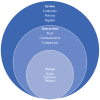Experiences of medical traumatic stress in parents of children with medical complexity
- PMID: 35947493
- PMCID: PMC10087969
- DOI: 10.1111/cch.13042
Experiences of medical traumatic stress in parents of children with medical complexity
Abstract
Background and objectives: Parents of children with medical complexity (CMC) experience high levels of stress and adverse mental health outcomes. Pediatric medical traumatic stress (PMTS) could be an important contributor that has not yet been explored. PMTS describes parents' reactions to their child's illness and medical treatment and can lead to post-traumatic stress symptoms. This is the first study to describe the experiences and impact of PMTS among parents of CMC.
Methods: We conducted semi-structured interviews with 22 parents of CMC. Reflexive thematic analysis was used to generate themes that described the experiences of PMTS and potential contributing factors in the healthcare setting. Themes were validated by study participants.
Results: Parents experienced a spectrum of events and circumstances that impacted PMTS. These corresponded to three major themes: (a) the distinctive context of being the parent of a CMC, (b) interactions with healthcare providers that can hurt or heal and (c) system factors that set the stage for trauma. The consequences of repeated PMTS were a common point of emphasis among all the themes. Parents identified numerous changes that could mitigate PMTS such as acknowledgement of trauma and provision of proactive mental health support.
Conclusions: Our study highlights the issue of PMTS among parents of CMC and presents opportunities to mitigate their traumatic experiences. Supporting the integration of trauma-informed care practices, increasing awareness of PMTS and advocating for parental mental health services could better support parents and families.
Keywords: children with medical complexity; complex, chronic conditions; medical traumatic stress; parent; post-traumatic stress; trauma; trauma-informed care.
© 2022 The Authors. Child: Care, Health and Development published by John Wiley & Sons Ltd.
Conflict of interest statement
None of the authors have any financial interest that would place them in conflict with this research. All authors approved the final manuscript as submitted and agree to be accountable for all aspects of the work.
Similar articles
-
Pediatric Medical Traumatic Stress and Trauma-Informed Care in Pediatric Chronic Illness: A Healthcare Provider Survey.J Pediatr. 2023 Oct;261:113580. doi: 10.1016/j.jpeds.2023.113580. Epub 2023 Jun 21. J Pediatr. 2023. PMID: 37353148
-
Between equilibrium and chaos, with little restitution: a narrative analysis of qualitative interviews with clinicians and parent carers of children with medical complexity.BMC Health Serv Res. 2024 Apr 23;24(1):504. doi: 10.1186/s12913-024-10973-6. BMC Health Serv Res. 2024. PMID: 38654202 Free PMC article.
-
Exploring the experiences of parent caregivers of children with chronic medical complexity during pediatric intensive care unit hospitalization: an interpretive descriptive study.BMC Pediatr. 2019 Aug 6;19(1):272. doi: 10.1186/s12887-019-1634-0. BMC Pediatr. 2019. PMID: 31387555 Free PMC article.
-
Parental Decision-Making for Children With Medical Complexity: An Integrated Literature Review.J Pain Symptom Manage. 2022 Jan;63(1):e111-e123. doi: 10.1016/j.jpainsymman.2021.07.029. Epub 2021 Aug 29. J Pain Symptom Manage. 2022. PMID: 34363953 Review.
-
The factors associated with paediatric medical post-traumatic stress: A systematic review.J Health Psychol. 2024 Sep 30:13591053241272214. doi: 10.1177/13591053241272214. Online ahead of print. J Health Psychol. 2024. PMID: 39344541 Review.
Cited by
-
Respite care: qualitative arts-based findings on the perspectives and experiences of families of children and youth with special healthcare needs residing in Manitoba, Canada.BMJ Open. 2023 Jun 29;13(6):e073391. doi: 10.1136/bmjopen-2023-073391. BMJ Open. 2023. PMID: 37385743 Free PMC article.
-
Cliff or bridge: breaking up with the paediatric healthcare system.Paediatr Child Health. 2023 Sep 4;29(2):84-86. doi: 10.1093/pch/pxad061. eCollection 2024 May. Paediatr Child Health. 2023. PMID: 38586492 Free PMC article.
-
Clinical and socioeconomic predictors of hospital use and emergency department visits among children with medical complexity: A machine learning approach using administrative data.PLoS One. 2024 Oct 29;19(10):e0312195. doi: 10.1371/journal.pone.0312195. eCollection 2024. PLoS One. 2024. PMID: 39471234 Free PMC article.
-
Children With Severe Neurologic Impairment and Their Families in the PICU: A Secondary Qualitative Analysis to Assess Clinician-Family Collaboration and Mutuality.Pediatr Crit Care Med. 2025 Jul 21:10.1097/PCC.0000000000003796. doi: 10.1097/PCC.0000000000003796. Online ahead of print. Pediatr Crit Care Med. 2025. PMID: 40689712
-
Contributions and recognition of patient partners in pediatric health research: A rapid scoping review protocol.MethodsX. 2025 Jun 17;15:103447. doi: 10.1016/j.mex.2025.103447. eCollection 2025 Dec. MethodsX. 2025. PMID: 40612264 Free PMC article.
References
-
- American Psychiatric Association . (Ed.) (2013). Diagnostic and statistical manual of mental disorders (5th ed.). American Psychiatric Association.
-
- Bogetz, J. F. , Trowbridge, A. , Lewis, H. , Shipman, K. J. , Jonas, D. , Hauer, J. , & Rosenberg, A. R. (2021). Parents are the experts: A qualitative study of the experiences of parents of children with severe neurological impairment during decision‐making. Journal of Pain and Symptom Management, 62, 1117–1125. 10.1016/j.jpainsymman.2021.06.011 - DOI - PMC - PubMed
Publication types
MeSH terms
LinkOut - more resources
Full Text Sources


